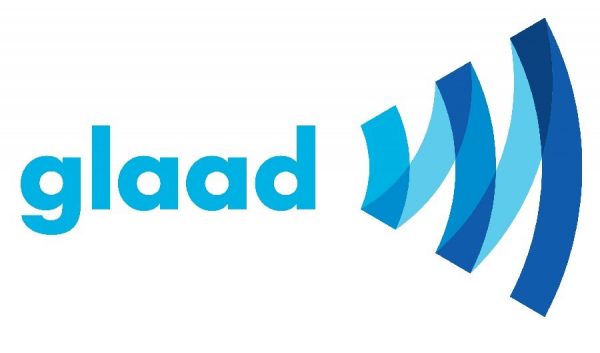South Dakota
GOP governor who signed anti-trans law: No clue LGBTQ+ people are sad
At 87%, South Dakota had the highest rate of LGBTQ+ residents reporting those mental health conditions, compared to 63% nationally
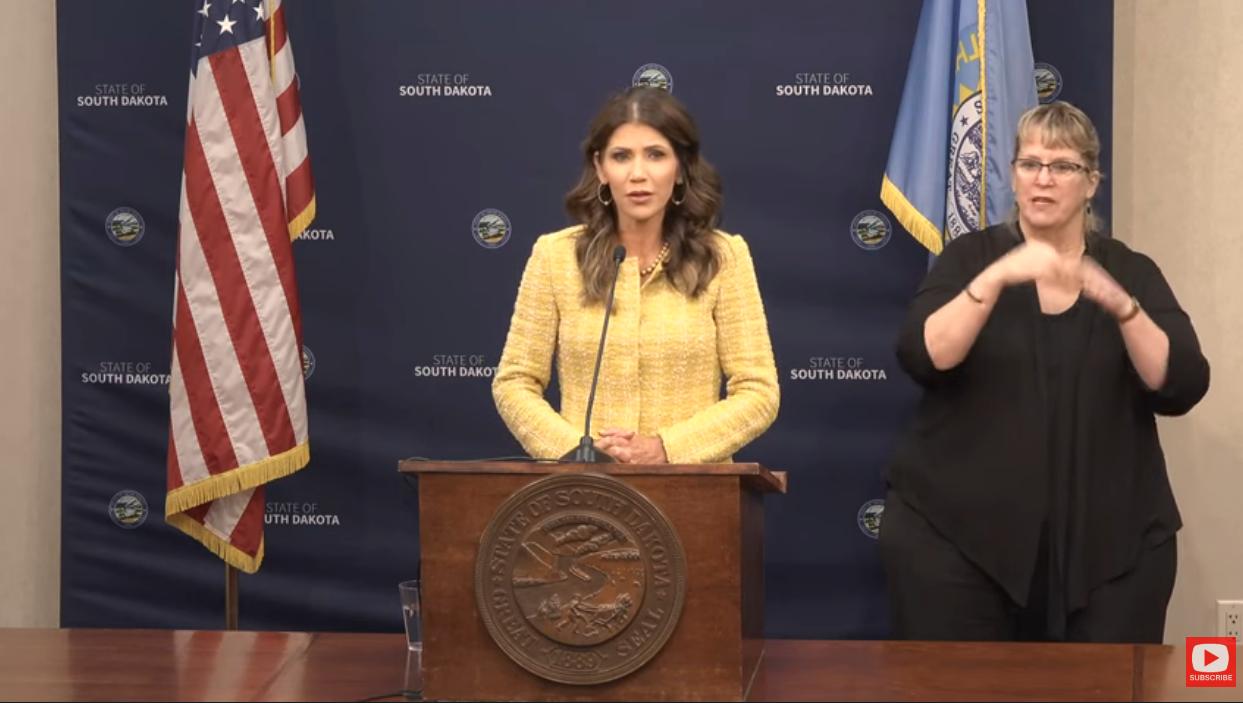
PIERRE – During her weekly press conference Thursday, South Dakota Republican Governor Kristi Noem was asked by a reporter her opinion of the fact that nearly 90% of the LGBTQ+ community in South Dakota reported dealing with anxiety or depression.
“I don’t know,” Noem responded. “That makes me sad, and we should figure it out.”
Critics were quick to point out that the governor’s answer was disingenuous since she had helped draft, pass, and then sign into law SB 46, which bans trans youth from participating in school sports consistent with their gender identity. With her signature, she became the first governor to sign discriminatory anti-transgender legislation into law in 2022.
One high profile opposition response came in the form of a Tweet from Principal White House Deputy Press Secretary Karine Jean-Pierre, who wrote: “Here’s a start for you, Governor. 1. Don’t advance policies that attack trans youth, 2. Don’t fund ads attacking LGBT youth, 3. support @POTUS’ agenda to enhance support for youth mental health needs, with funding made available through the American Rescue Plan.”
Here’s a start for you, Governor. 1. Don’t advance policies that attack trans youth, 2. Don’t fund ads attacking LGBT youth, 3. support @POTUS’ agenda to enhance support for youth mental health needs, with funding made available through the American Rescue Plan. https://t.co/FQLV0pYIsk
— Karine Jean-Pierre (@KJP46) February 18, 2022
The question to the governor was attributed to a recent report by HelpAdvisor, a health and health care coverage assistance site, that analyzed rates of anxiety and depression among LGBTQ+ people across the United States. At 87%, South Dakota had the highest rate of LGBTQ+ residents reporting those mental health conditions, compared to 63% nationally.
According to The Trevor Project’s 2021 National Survey on LGBTQ Youth Mental Health, 42% of LGBTQ youth seriously considered attempting suicide in the past year, including more than half of transgender and nonbinary youth. However, LGBTQ youth who had access to spaces that affirmed their sexual orientation and gender identity — including schools — reported lower rates of attempting suicide than those who did not.
A recent poll conducted by Morning Consult on behalf of The Trevor Project found that 85% of transgender and nonbinary youth—and two-thirds of all LGBTQ youth (66%) — say recent debates about state laws restricting the rights of transgender people have negatively impacted their mental health. When asked about proposed legislation that would require schools to tell a student’s parent or guardian if they request to use a different name/pronoun or if they identify as LGBTQ at school, 56% of transgender and nonbinary youth said it made them feel angry, 47% felt nervous and/or scared, 45% felt stressed, and more than 1 in 3 felt sad.
Gov. Noem Gives Legislative Update 2-17-2022
South Dakota
South Dakota’s first LGBTQ+ ministry, “Shepherd’s Table” opens
An Evangelical Lutheran church pastor had a vision to bring LGBTQ+ people together through meals and religious services in Sioux Falls
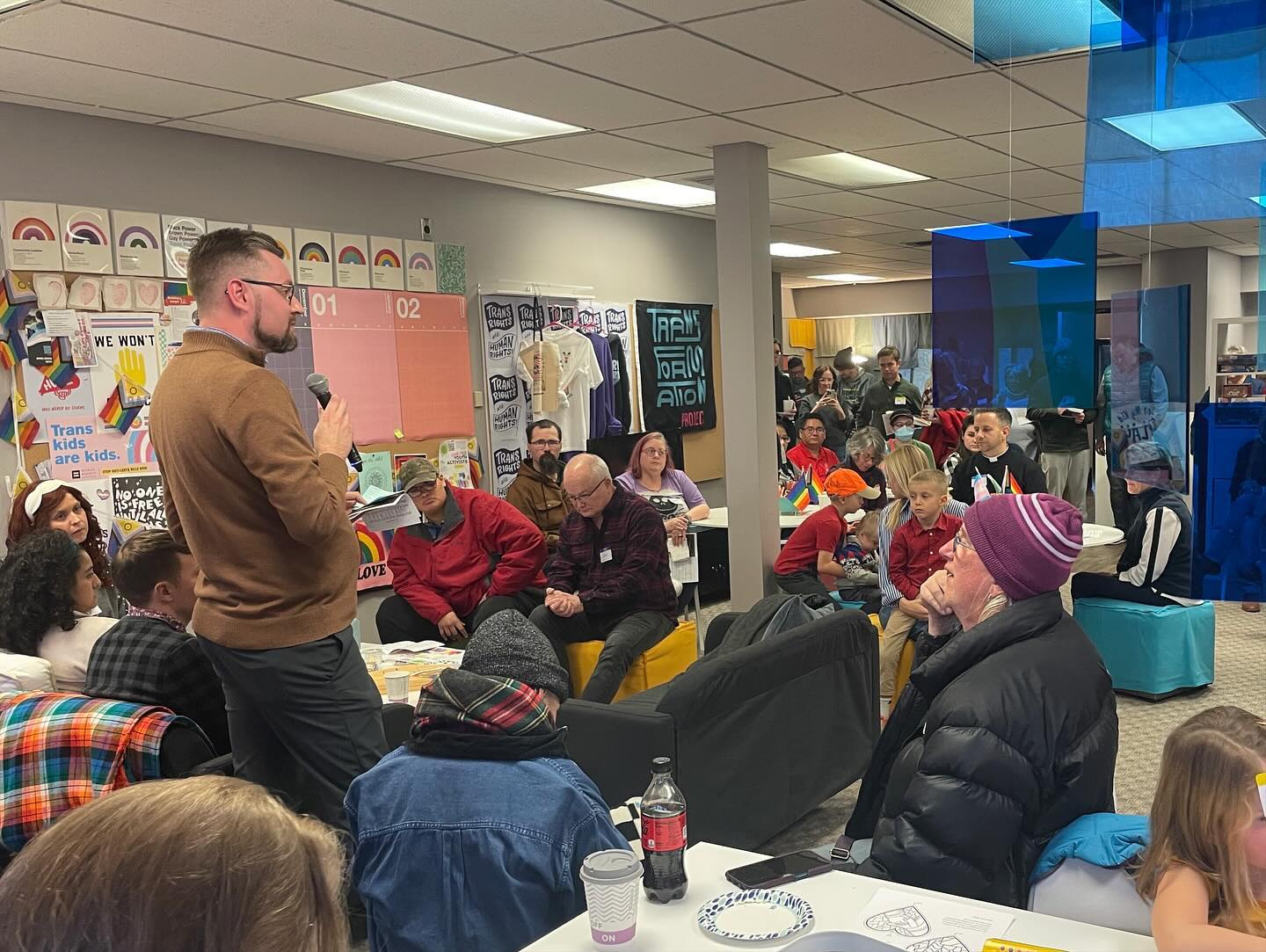
By Lana Leonard | SIOUX FALLS, S.D. – Rev. Sawyer Vanden Heuvel hails from a small town where his church shunned him for being LGBTQ. However, when the pastor moved to South Dakota he became pastor in the Evangelical Lutheran Church in America (ELCA).
It didn’t take long for Vanden Heuvel’s faith to beckon him to lead, and thus, he founded “a place for all” called Shepherd’s Table; born at the only LGBTQ community center in the state called the Prism Center.
This month, Shepherd’s Table became the first LGBTQ place of worship in South Dakota.
“Opening Shepherd’s Table has been a dream since I first connected with people while tabling with other Lutherans at a local Sioux Falls Pride event in 2021,” Vanden Heuvel said in an email to GLAAD. “There, I met so many LGBTQ+ folks in the area who had stories and experiences like that of many queer folk, including myself.”
The stories Vanden Heuvel heard were those of being kicked out of faith communities for coming out, stories of heartache, trauma, and survival; as well as stories of shame and isolation that come from being queer in the Midwest.
“The constant refrain I heard from people was how they longed for a community where both faith and queerness are not at odds with each other – a community where they truly could belong and experience the expansiveness of God’s love for all people,” said Vanden Heuvel.
That dream is now a reality. Two years ago Vanden Heuvel, also a 2020 GLAAD Media Institute Alum, had a “vision” for the ministry he founded.
The new, inclusive, community in Sioux Falls, South Dakota seeks to be a place for all to gather. And also, a place where LGBTQ people can be “seen, heard, loved, welcomed, and fed at Christ’s table,” reads the Shepherd’s Table website. “The Gospel of Jesus Christ does not discriminate, but we know that in some faith communities, people have been shamed or discriminated against for being LGBTQIA+. We welcome all to the table to experience the expansiveness of God’s love for all people,” the site continues.
With this said, the inclusive ministry practices: embracing LGBTQ people and their faith, and ensures the people are fed.
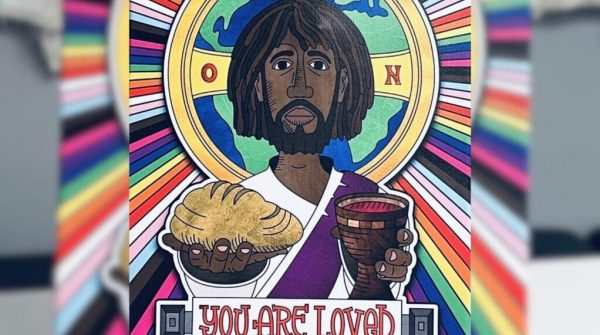
“[T]o witness the Holy Spirit make dreams like this become realized for a public, unapologetic, unashamed ministry of the Church that is focused on supporting LGBTQ+ people and their families, moves me deeply because I know this, without a doubt, will become life-saving and vital work for many who call South Dakota home.” Vanden Heuvel said.
Shepherd’s Table was founded on the call to remember Jesus as the “Good Shepherd.” The Good Shepherd who tends “to his flock and makes sure all are found in his fold.” The organizers also remember those fallen from violence against them. For instance, the community ensures Matthew Shepard’s memory always has a seat at Shepherd’s Table. Two anti-LGBTQ Laramie residents murdered Shepard for being a gay man in 1998. Shepard was a 21-year-old University of Wyoming college student at the time.
“We consider Matthew’s life to be remembered as a saint and martyr for all of our queer siblings,” the ministry’s website reads.
St. Mark’s Lutheran Church in Sioux Falls recently called Vanden Heuvel to serve, and then he became the mission developer and pastor for the Shepherd’s Table faith community. He earned his Master of Divinity in 2023 from Luther Seminary in Saint Paul, Minnesota. In addition to earning his Bachelor of Arts in 2012 from Augustana University in Sioux Falls. Heuvel is passionate about building longer tables and creating spaces of belonging so that all may be fed, seen, heard, and loved at Christ’s table.
*****************************************************************************************
GLAAD Media Institute provides activist, spokesperson, and media engagement education, consultation and research for LGBTQ and allied community members, the media industry and advocacy organizations desiring to deepen their media impact
South Dakota
South Dakota Governor asks colleges to ban drag shows
Noem targeted college student life, including removing references to and enforcement of preferred pronouns, prohibiting drag shows on campus

PIERRE, S.D. – Republican Governor Kristi Noem sent a letter last week to the South Dakota Board of Regents, which is the governing board that controls six public universities in the state, telling the Board that in her opinion higher education for Dakotans was in crisis.
Echoing the political philosophy of her fellow Republican governor, Florida’s Ron DeSantis, Noem criticized instructional methods in universities saying that professors were focusing on “feelings rather than facts.”
The governor also took aim at diversity programs saying that students were being taught equity and “safe spaces” rather than “learning to tolerate the disagreement, discomfort, and dissent they will experience in the real world.”
Noem also targeted college student life, including removing references to and enforcement of preferred pronouns, prohibiting drag shows on campus, and removing policies that prohibit students from exercising their right to free speech, the latter regarding use of what has been defined hate speech against the LGBTQ+ community based on religious freedoms and expressions.
KSFY-TV reported that Board of Regents issued a statement this past Friday that it is still reviewing the contents. Adding that it was eager to have “a willing partner in higher education.”
The letter contained several goals that the Board of Regents has worked on for many years. This letter, along with our internal Strategic Plan and Senate Bill 55 Legislative Taskforce, presents solutions to support the growth of South Dakota’s workforce through our public universities.
According to KSFY-TV the Board stated that its main goal is readying the next generation of leaders with skills to grow the state’s economy. “We are fully committed to this mission.”
In addition to the letter the governor in a press release announced that she also launched a whistleblower hotline calling for South Dakota to be “an example to the nation of what quality higher education should look like.”
CBS News affiliate KELO’s Capitol Bureau reporter Bob Mercer noted that Noem said the “whistleblower hotline” is for students, parents, taxpayers and faculty to call and voice concerns. The number is (605) 773-5916.
KELO also reported the hotline audio said:
“This hotline was created for students and faculty to keep our universities accountable to South Dakota values,” the recording says. “And be an example to the nation of what good higher education looks like.”
In a statement to KELO, Shuree Mortenson, a spokeswoman for the Board of Regents, said the hotline is being managed by the governor’s office and the BOR is still reviewing the contents of the letter.
Related:
South Dakota
South Dakota bans gender-affirming medical care for Trans youth
86% of transgender & nonbinary youth say state laws restricting the rights of transgender people have negatively impacted their mental health
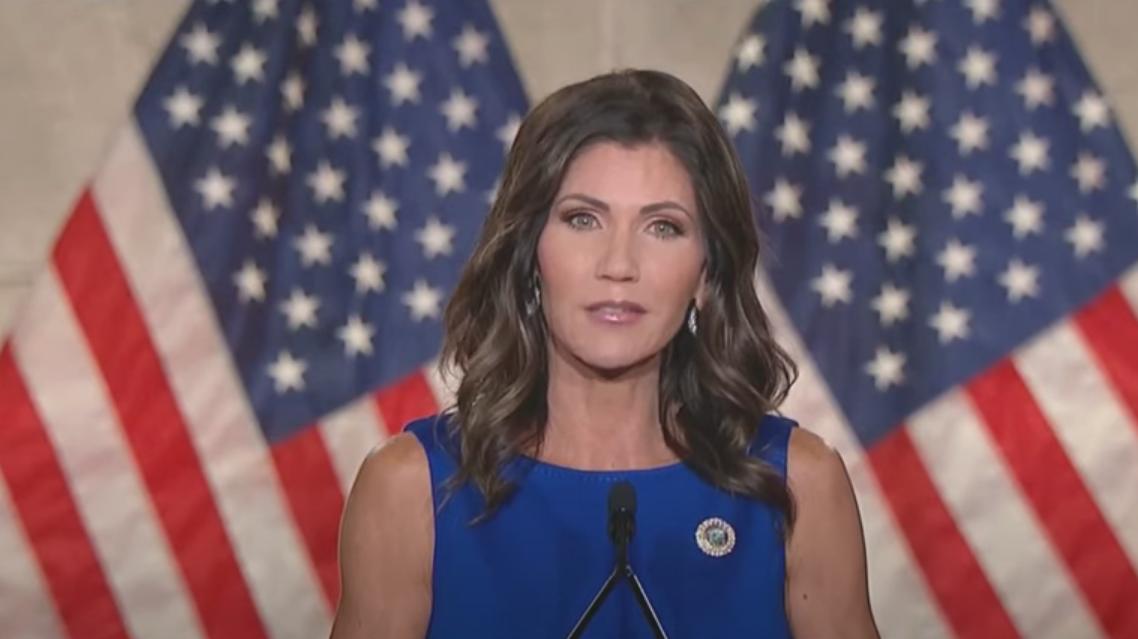
SIOUX FALLS – Ignoring the warnings of families, advocates, health care providers, and transgender South Dakotans themselves, South Dakota Republican Governor Kristi Noem signed a law banning gender-affirming health care for any transgender person under 18 Monday.
The American Civil Liberties Union (ACLU) and the ACLU of South Dakota issued the following joint statement:
“Today is a heartbreaking and tragic day for thousands of South Dakotans and their families. This ban won’t stop South Dakotans from being trans, but it will deny them critical support that helps struggling transgender youth grow up to become thriving transgender adults. But make no mistake–this fight is not over. We will never stop fighting for the right of trans youth to get the love, support, and care that every young person deserves. As much as Governor Noem wants to force these young people to live a lie, we know they are strong enough to live their truth, and we will always fight for communities and policies that protect their freedom to do so.”
South Dakota is the fourth state in the country and the second state this legislative session to ban gender-affirming care for transgender youth after Utah passed a similar ban last month. Similar laws in Alabama and Arkansas are currently enjoined by federal courts.
The Trevor Project, the leading suicide prevention organization for LGBTQ young people, condemned the signage of HB 1080 into law, a bill banning doctors from providing best-practice medical care to transgender and nonbinary youth.
“This ban denies transgender and nonbinary youth crucial support and care. Even in the face of professional guidance from every major medical and mental health association in the country that supports this type of care, politicians are intruding into the private medical decisions best left to transgender young people and their families,” said Casey Pick, Director of Law and Policy for The Trevor Project. “We are committed to keep fighting for the rights of young trans South Dakotans to access the best-practice, medically necessary health care they need to survive and thrive. We are here for you and we aren’t going anywhere.”
The Trevor Project’s 2022 U.S. National Survey on LGBTQ Youth Mental Health by State found that 53% of LGBTQ youth in South Dakota seriously considered suicide in the past year, and nearly 1 in 5 (19%) made an attempt.
At a national level, The Trevor Project’s data has found that 71% of transgender and nonbinary youth reported that they have experienced discrimination based on their gender identity, and those who have reported significantly higher rates of attempting suicide in the past year compared to those who have not.
However, research has also consistently found that transgender medical care, is associated with positive mental health outcomes including showing promise for reducing suicide risk.
A 2021 peer-reviewed study by The Trevor Project, the first large-scale study of more than 9,000 youth who received gender-affirming hormone therapy (GAHT), found that GAHT was significantly related to lower rates of depression, suicidal thoughts, and suicide attempts among transgender and nonbinary youth. Specifically for young people under age 18, receiving GAHT was associated with nearly 40% lower odds of recent depression and of a past-year suicide attempt.
According to The Trevor Project’s new polling, 86% of transgender and nonbinary youth say recent debates about state laws restricting the rights of transgender people have negatively impacted their mental health. When asked about new policies that will ban doctors from providing gender-affirming medical care to transgender and nonbinary youth, 74% of transgender and nonbinary youth said it made them feel angry, 59% felt stressed, 56% felt sad, 48% felt hopeless, 47% felt scared, 46% felt helpless, and 45% felt nervous.
Further, a 2022 poll conducted by Morning Consult on behalf of The Trevor Project found that a majority of adults agree that transgender minors should have access to gender-affirming hormone therapy (55%) and puberty blockers (52%) if it’s recommended by their doctor and supported by their parents.
Only 1 in 3 adults polled said lawmakers should have the ability to outlaw gender-affirming medical care for minors even if such a ban is against the recommendation of doctors and major medical associations.
South Dakota
South Dakota enacts bill that would censor so-called ‘divisive concepts’
This is the second anti-LGBTQ+ bill signed by Gov. Noem this year. She signed SB 46, an anti-trans sports ban in February
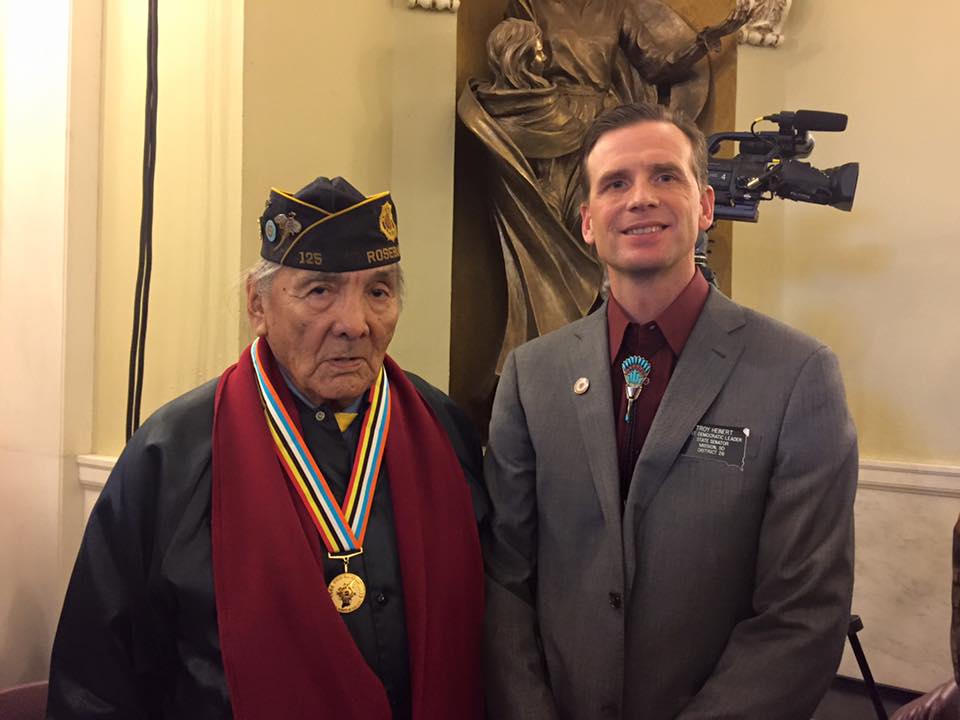
PIERRE – South Dakota Republican Governor Kristi Noem signed House Bill 1012 Wednesday, titled ‘An Act to protect students and employees at institutions of higher education from divisive concepts’, that she authored and submitted to the state’s legislature.
Critics charge that HB 1012 sanitizes information and truth in school curriculums and does not equip students with the critical thinking skills needed to succeed. The bill forces self-censorship with educators and is an effort to erase and marginalize Indigenous history, LGBTQ+ education, and other oppressed voices in and outside of the classroom.
In a statement released by her office the governor alleges that the legislation prohibits colleges from requiring students and teachers to attend trainings or orientations based on Critical Race Theory.
“No student or teacher should have to endorse Critical Race Theory in order to attend, graduate from, or teach at our public universities,” said Noem. “College should remain a place where freedom of thought and expression are encouraged, not stifled by political agendas.”
A source with the faculty at South Dakota State University, speaking on background, told the Blade Wednesday that the legislation is weaponized to silence minority voices, especially LGBTQ+ people and Native Americans.
“By passing and then signing this onerous partisan bill, Noem just ensured that the only voices in the room will be White, Christian, and opposed to having students being able to think for themselves,” the source said. “Conceivably the massacre at Wounded Knee will be sanitized and categorized as a necessary ‘treaty enforcement’ by the U.S. Army. This bill will lead to revisionism created by an atmosphere of fear where my colleagues would be reluctant to put their employment in jeopardy if they dared to tell the truth.”
“There’s also the fact that issues around same-sex marriage- but acutely Transgender people and the treatment they receive plus the fact that there is an active effort to erase their existence means any rational classroom discussion or lectures would not occur so as to- god forbid, not offend the so-called conservatives under the definition of ‘ divisive concepts’. This is ridiculous but shows people outside of our state the mendacity of Noem and her supporters,” the source added.
In a powerful moment during the committee hearing on HB 1012, State Sen. Troy Heinert, a member of the Rosebud Sioux Tribe, shared how the bill would keep educators from teaching about his people’s history.
“I do not blame any member of this committee for what happened or the plight of the American Indian. I know it is not your fault, but I do expect you to understand it and be empathetic as to some of the conditions that we currently live in right now,” he said. “Let teachers teach. Let people understand the true history of our state, our country. We don’t have to make them feel bad. That’s not anybody’s intention. But if you don’t understand you’re bound to repeat it,” Sen. Heinert said.
Journalist Christopher Vondracek writing for the Forum News Service published in the Republic newspaper in Mitchell, South Dakota noted; The text of the bill, which was heavily edited by the state Legislature, doesn’t mention the words “critical race theory” anywhere in its final form. After the measure passed the House of Representatives last month , the chamber approved a title change to accurately reflect the bill’s impact.
A companion bill that would have more directly affected teaching in the K-12 environment failed by a vote in the Senate Education committee.
In a statement to Forum News Service, South Dakota Democratic Party Executive Director Berk Ehrmantraut said the state should be investing in higher education, not “attacking educators.”
“Educators should not be forced by politicians to teach lessons that edit or remove parts of our country’s history. Students deserve the freedom to learn: to develop the knowledge and skills to reckon with our past and change our nation for the better,” Human Rights Campaign State Legislative Director and Senior Counsel Cathryn Oakley said.
“But Gov. Noem and South Dakota legislators want to censor the truth and pass laws that ban students from learning about marginalized people, including the LGBTQ+ community. Students in South Dakota deserve to have a safe, high-quality education that teaches honesty, integrity, and the courage to do what’s right. Shame on Gov. Noem,” Oakley added.
This is the second anti-LGBTQ+ bill signed by Gov. Noem this year. She signed SB 46, an anti-trans sports ban in February, becoming the first governor to sign discriminatory anti-transgender legislation into law in 2022. The bill bans trans youth from participating in school sports consistent with their gender identity and was authored and submitted to the legislature by the governor.
***********************
South Dakota
South Dakota lawmakers send ‘divisive concepts’ ban to governor
Restricts the promotion of “divisive concepts” relating to race, gender and sex at state colleges and universities
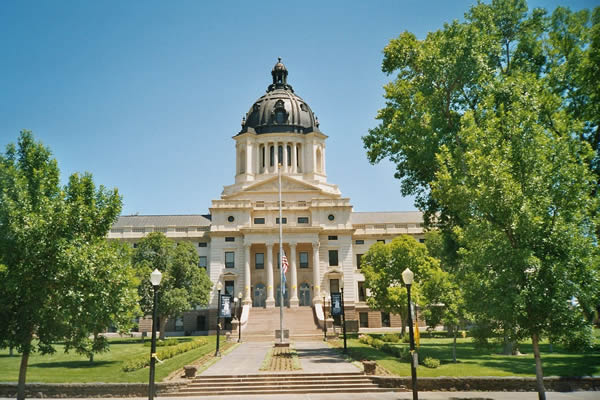
PIERRE – A South Dakota bill heavily restricting the promotion of “divisive concepts” relating to race, gender and sex at state colleges and universities cleared the legislature Monday, now heading to the desk of Republican Gov. Kristi Noem.
As the Florida Senate sent its widely criticized “Don’t Say Gay” bill to Republican Gov. Ron DeSantis Tuesday, South Dakota sent its own legislation restricting education to Noem. The Senate voted 27-8 on H.B. 1012 Monday, but amendments added by the upper chamber forced it to be approved again by the House. Noem, who helped draft the measure, is likely to sign it.
Unlike Florida’s “Don’t Say Gay” bill, South Dakota’s “divisive concepts” legislation targets higher education, not K-12 schools. It also aims at race, gender and sex – including the GOP hot button issue of so-called Critical Race Theory (CRT) – while Florida’s measure bans classroom discussions on gender identity and sexual orientation that isn’t “age appropiate.”
College courses would not be restricted under the bill, meaning professors could still teach any subject matter. But schools cannot “direct or compel” students or faculty to attend or participate in any training or orientation that promotes “divisive concepts.”
“Divisive concepts” include making individuals think they are “inherently responsible” for historical actions or feel “discomfort, guilt, anguish, or any other form of psychological distress on account of the individual’s race, color, religion, ethnicity, or national origin.”
Noem has positioned herself as conservative who is staunchly against CRT and certain LGBTQ+ rights. Last month, Noem signed an anti-Trans sports bill, the first to gain approval from a governor in 2022. She was also criticized for saying she didn’t know why LGBTQ+ people in South Dakota reported high rates of anxiety or depression, while pushing for anti-LGBTQ+ bills.
The measure gained broad support from Republicans, but some did raise concerns it would limit First Amendment rights on college campuses.
“I cannot support the idea that state government should create a list of ideas, write them into statute, and call them divisive,” said Republican Sen. David Wheeler on the floor. “It’s incredibly difficult to legislate effectively on broad concepts.”
But other Republicans argued that the bill wouldn’t limit rights on campuses. “They can take Intro to Critical Race Theory. They can have spirited debates,” said Republican Sen. Jessica Castleberry, who presented the measure to the Senate. “This preserves institutional neutrality by preventing critical race theory and divisive concepts from being adopted at the institutional level.”
A GOP-led committee rejected a similar “divisive concepts” bill aimed at teaching in K-12 schools.
LGBTQ+ and social justice organizations decried the passage of the legislation, with one group calling it “chilling.”
“Our country needs to acknowledge and reckon with its history of systemic racism — this includes being able to teach and talk about these concepts in our schools,” said Jett Jonelis, ACLU of South Dakota advocacy manager, in a statement.
The Human Rights Campaign (HRC), the nation’s largest LGBTQ+ rights organization, warned in a news release that the bill would “erase and marginalize Indigenous history, LGBTQ+ education, and other oppressed voices in and outside of the classroom.”
“Students should be taught an honest and accurate history of our nation, including the good and the bad,” said Cathryn Oakley, state legislative director and senior counsel for the HRC, adding: “Teaching young adults the full scope of reality for LGBTQ+ and other marginalized people, both historically and today, we can help build a fully realized society where everyone can take pride in their individual identities.”
South Dakota
South Dakota Governor signs first anti-Trans bill of 2022 into law
“SB 46 attempts to solve a problem that doesn’t exist- slamming the door shut for Trans student athletes to fully participate”
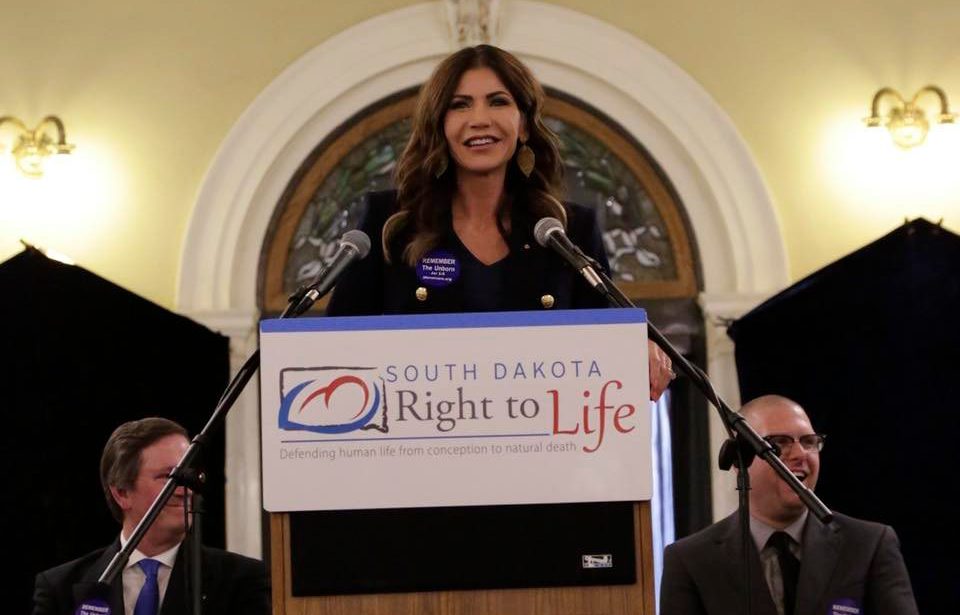
PIERRE – The Republican Governor of South Dakota, Kristi Noem signed Senate Bill 46 into law Thursday effectively keeping Trans students, especially Trans women and girls, from playing on women’s and girls sports teams which would affirm their gender identity.
The Trevor Project, the world’s largest suicide prevention and crisis intervention organization for lesbian, gay, bisexual, transgender, queer & questioning (LGBTQ+) young people, condemned Noem for signing what the organization is listing as the first anti-transgender bill of the year into law in the nation.
“At a time when young people are facing an unprecedented need for support, it is devastating to see politicians instead invent new ways to exclude them,” said Sam Ames, Director of Advocacy and Government Affairs at The Trevor Project. “We want to remind every young trans person watching tonight that there are more people fighting for you than against you. We have your back, and we will continue working with our partners and advocates on the ground to challenge these laws and ensure that all youth have the support they need to survive and thrive.”
The Argus Leader, the daily newspaper of Sioux Falls, South Dakota, reported that opponents of this legislation say it’s likely to bring a lawsuit. The text of the bill states that any student suffering direct or indirect harm as a result of a violation of the bill can sue the district or university; the state attorney general will represent the school, district or college that’s sued.
SB 46 was first heard in the Senate State Affairs committee last month, where it passed on an 8-1 vote. The sole dissenter was Sen. Troy Heinert, who said it would send a message that trans children aren’t welcome in the state, the Argus Leader also noted.
According to a recent poll conducted by Morning Consult on behalf of The Trevor Project, 85% of transgender and nonbinary youth — and two-thirds of all LGBTQ youth (66%) — say recent debates about state laws restricting the rights of transgender people have negatively impacted their mental health.
When asked about new policies that would ban transgender girls from playing on girls’ sports teams and transgender boys from playing on boys’ sports teams, 74% of transgender and nonbinary youth said it made them feel angry, 57% felt sad, 43% felt stressed, and nearly 1 in 3 felt scared.
When the bill was being considered in the House State Affairs committee, it passed on an 11-2 vote, but not without arguments from Noem’s general counsel and chief of staff Mark Miller who said transgender peoples’ participation in sports is akin to terrorism.
“Senate Bill 46 attempts to solve a problem that does not exist while slamming the door shut for transgender student athletes to fully participate in their school communities,” said Jett Jonelis, ACLU of South Dakota advocacy manager. “Transgender students participate in sports for the same reasons other young people do: to challenge themselves, to stay fit and healthy and to be a part of a team. Trans students’ humanity, dignity, and ability to be full members of their school communities should never be up for debate like this.”
South Dakota
South Dakota Legislature passes first anti-Trans bill of 2022
85% of transgender and nonbinary youth say that recent debates around anti-trans bills have negatively impacted their mental health
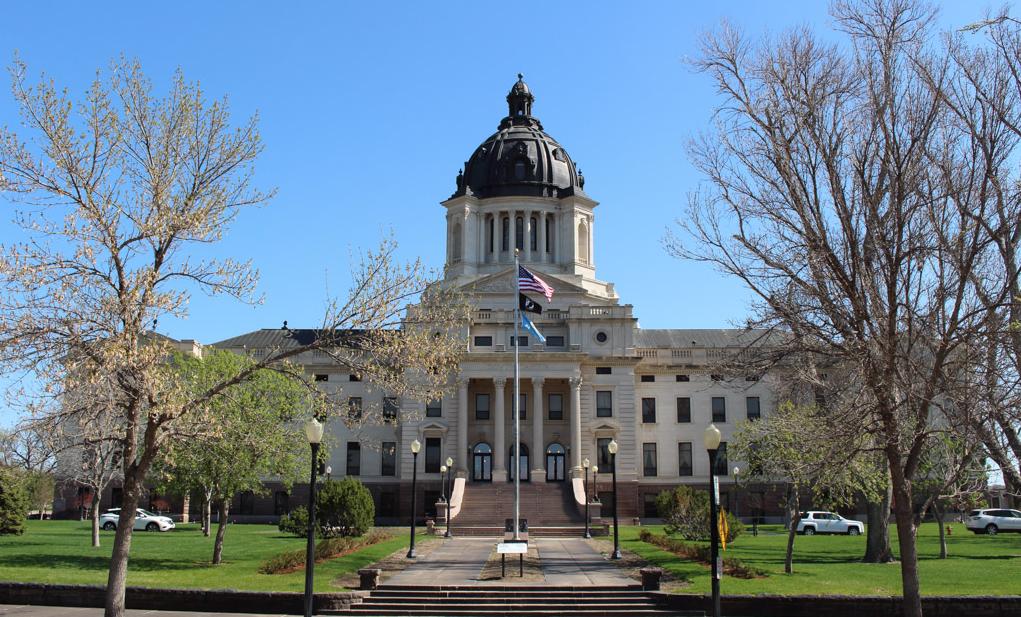
PIERRE – The South Dakota House of Representatives passed two anti-Transgender bills Tuesday. HB 1005, which would restrict Trans students from using bathrooms and locker rooms that align with their gender identity, and SB 46, which would restrict Trans women and girls from playing on school sports teams that match their gender identity.
HB 1005 is now headed to the South Dakota Senate and SB 46 is headed to Republican Governor Kristi Noem’s desk, where it is expected to be signed into law and become the first anti-Trans bill enacted in 2022 by a state.
Senate Bill 46 was authored and submitted to the legislature by Noem. The hasty passage of this bill comes after a historically bad 2021 session that saw a record number of anti-Trans bills introduced and passed across the country. Last month, South Dakotans gathered for six concurrent rallies across the state in protest of this legislation and other anti-transgender bills introduced this year.
This weekend, hundreds of South Dakotans showed up in support of trans youth.
— Human Rights Campaign (@HRC) January 18, 2022
Three anti-trans bills have been filed in the South Dakota legislature — two preventing kids from playing sports and one discriminatory bathroom bill.
We will not stop fighting to #ProtectTransKids. pic.twitter.com/3eGEjAqNYv
In 2021, after issuing a style-and-form veto of an anti-trans sports ban bill, Noem issued two executive orders that effectively implemented the policy articulated in the vetoed legislation.
“The votes today by House lawmakers are shameful,” said Jett Jonelis, ACLU of South Dakota advocacy manager. “Senate Bill 46 and House Bill 1005 reinforce the incorrect notion that transgender students are not entitled to the same dignity and respect as all students.”
On Senate Bill 46:
“Senate Bill 46 not only discriminates against trans women and girls in ways that compromise their health, social and emotional development, and safety, but also it violates federal constitutional guarantees of equal protection,” Jonelis said. “It perpetuates harmful myths about transgender people and reduces trans students to political pawns. Our lawmakers should be focused on protecting South Dakota’s youth by creating safe and welcoming environments rather than launching baseless attacks to score political points.”
On House Bill 1005:
“Transgender people, whether people know it or not, are already using the bathrooms and communal facilities they have a right to – and doing so without incident,” Jonelis said. “If House Bill 1005 is enacted, transgender people will have to make the impossible decision of breaking the law or revealing their private medical information – not to mention the obvious risk of harassment and violence that comes with forcing transgender people into the facilitates that do not match their gender identity. It is quite clear whose privacy and very lives are really at risk if our legislators continue to succumb to anti-trans fear and hatred and give it state sanction like this.”
“This early on in 2022, a year when we as a nation are facing unprecedented obstacles, it’s as heartbreaking as it is infuriating to see South Dakota lawmakers put such effort into attacking transgender youth. Bills like these are unnecessary and cruel, and we know the ugly rhetoric surrounding them is having a real impact on the mental health and wellbeing of one of our most marginalized groups of young people,” said Sam Ames, Director of Advocacy and Government Affairs at The Trevor Project.
“The Trevor Project’s research has found that transgender and nonbinary youth who reported experiencing discrimination based on their gender identity over something as basic as using the bathroom had nearly double the odds of attempting suicide in the past year compared to those who did not. Lawmakers should be focusing on the real issues facing these young people and fostering spaces where everyone can be safe, not making life harder than it already is for the transgender and nonbinary youth of South Dakota.”
South Dakota
South Dakota House committee approves anti-Trans youth athlete ban
The measure now moves to the full House for a vote- as the Senate already approved it will then head to Governor Noem for her signature

PIERRE – The Republican-majority House State Affairs committee voted to approve a measure from Republican Governor Kristi Noem that would ban Trans girls from competing in school sports leagues in South Dakota matching their gender identity.
The measure now moves to the full House for a vote and then, as the Senate had already approved the measure last week, it will head to Governor Noem for her signature. The governor had lobbied hard for the measure to be passed, which has Trans South Dakotan youth speaking out.
“Transgender girls like me want to play sports,” Hoera Kingi, a high school senior who has competed on her school’s cheerleading team told the Associated Press, adding that a ban on her competing as a girl “would have stopped me from meeting some of my favorite people and making some of my most cherished memories.”
Trans allies and parents have labeled the measure bullying. After passage in the Senate, Human Rights Campaign State Legislative Director and Senior Counsel Cathryn Oakley dcried the bill:
“South Dakota’s legislature has been an innovator in discrimination against transgender people, and SB 46 continues this shameful legacy by being the very first anti-trans bill passed by a legislative chamber this year. The South Dakota legislature has been rehashing the same conversation about trans youth participation in school sports for years and yet there still is no evidence that transgender youth participating in school sports has posed an actual problem. These bills don’t protect or empower girls and women – rather, they perpetuate sexist stereotypes and try to turn teammates against each other. It is time for South Dakota to let kids be kids.”
Organizations representing the state’s public schools have also voiced opposition to the bill, arguing that the high school activities association already has an effective policy that evaluates applications from transgender athletes on a case-by-case basis. School groups warned the bill, if enacted, would put them at odds with federal law, exposing them to the potential of lawsuits, a federal civil rights investigation or possibly a loss of federal funding, the Associated Press noted.
Noem’s chief of staff, Mark Miller, defended the legality of the proposal and pointed to instances when trans athletes in other states have given dominant performances.
“It’s sort of like terrorism, you want to keep it over there, not let it get over here,” he said when a Democratic lawmaker questioned why the governor was taking up the issue when it has not stirred controversy in South Dakota sports.
Democratic State Representative Jamie Smith called Miller’s comparison “absolutely disgusting.”
“Despite its title, this bill has nothing to do with fairness — and everything to do with South Dakota politicians using transgender youth as pawns on a political chessboard,” said Sam Ames, Director of Advocacy and Government Affairs at The Trevor Project. “Proponents of this blanket ban are hard-pressed to find examples of transgender students making South Dakota sports less fair or safe. Research from The Trevor Project makes clear that many already opt out of sports due to fear of bullying and discrimination.”
Legislators in a record 34 states introduced 147 anti-transgender bills in 2021, focusing on discriminatory anti-equality measures to drive a wedge between their constituents and score short-term political points. In 2021, twelve states enacted anti-LGBTQ+ bills despite failing to provide examples of what exactly they’re legislating against.
A poll conducted by the Human Rights Campaign & Hart Research Group revealed that, with respect to transgender youth participation in sports, the public’s strong inclination is on the side of fairness and equality for transgender student athletes. 73% of voters agree that “sports are important in young people’s lives. Young transgender people should be allowed opportunities to participate in a way that is safe and comfortable for them.”
South Dakota
South Dakota Senate committee advances anti-Trans youth sports bill
“Every child deserves to be lifted up and supported by their leaders and their government, not targeted and dehumanized”
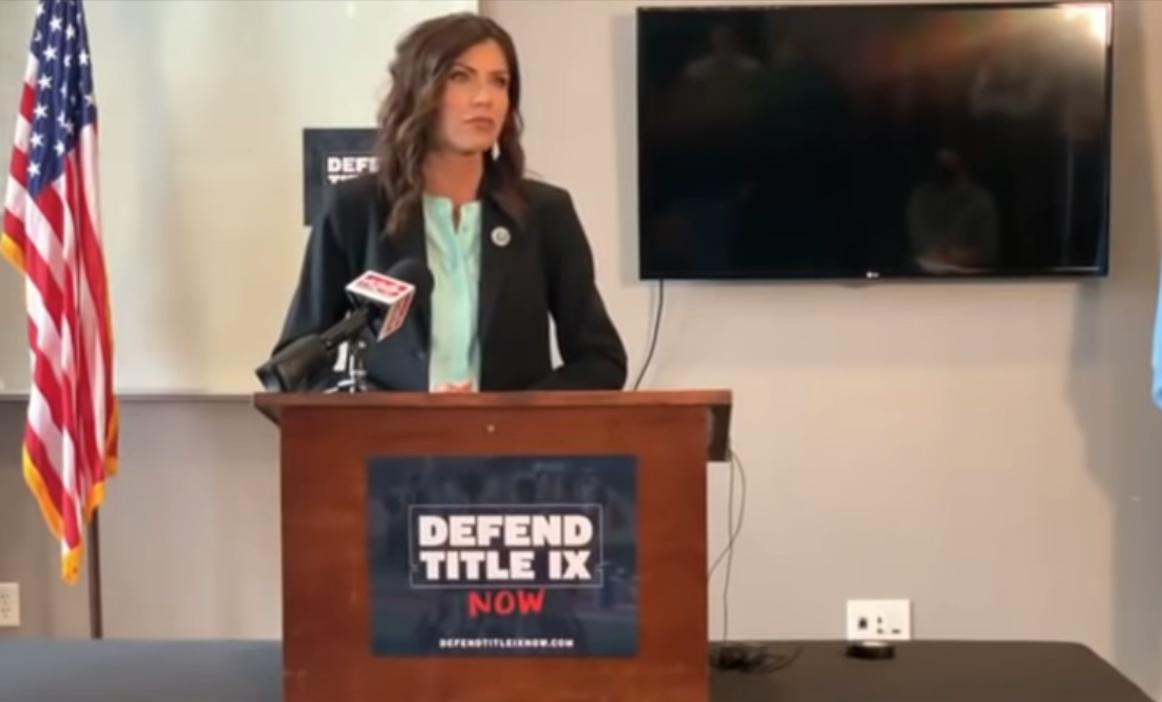
PIERRE – The South Dakota Senate State Affairs Committee voted to advance Senate Bill 46, legislation that would ban transgender women and girls from competing on the sports teams that match their gender identity.
Noem’s bill, S.B. 46, is one of three anti-trans that South Dakota has introduced in early 2022 – coming off a year that saw unprecedented legislative attacks on the trans community, especially in sports.
In a press release, Noem alluded to her anti-trans sports bill working similarly to Texas’ ban on abortions after six weeks, which attempts to circumvent the U.S. Supreme Court’s landmark decision in Roe v. Wade by allowing citizens to enforce the law with lawsuits.
“The legislation I am proposing includes the ability for a parent to hold schools accountable in court,” she said. “Parents will be able to sue to play, not to pay.”
It is still unclear if the tactic will be able to successfully evade courts striking down the law. The Supreme Court refused to block Texas’ abortion ban but did say that abortion providers have the right to sue.
At the end of last year, Noem introduced a bill that would have codified two of her anti-trans executive orders – one focusing on K-12 schools and the other taking aim at college sports.
She wrote the orders shortly after vetoing an anti-trans sports bill from the state legislature, fearing the National Collegiate Athletic Association (NCCA) would take the state to court over the bill. Otherwise, Noem praised the proposal, even saying she was “excited to sign” it before changing her position.
The South Dakota High School Activities Association still allows trans student-athletes to compete. In addition, the NCAA supports trans people participating in sports.
“Senate Bill 46 attempts to solve a problem that does not exist while slamming the door shut for transgender student athletes to fully participate in their school communities,” said Jett Jonelis, ACLU of South Dakota advocacy manager. “Transgender students participate in sports for the same reasons other young people do: to challenge themselves, to stay fit and healthy and to be a part of a team. Trans students’ humanity, dignity, and ability to be full members of their school communities should never be up for debate like this.”
Senate Bill 46, which was introduced on behalf of Republican Governor Kristi Noem, is intended to inflame a political reaction, not protect fairness in women’s sports the ACLU and LGBTQ+ activists contend. The state has not seen any issues with transgender women or girls competing in sports. The South Dakota High School Activities Association already has a policy in place for transgender athletes. Likewise, the NCAA also has clear policies on the inclusion of transgender student-athletes and their participation in intercollegiate athletics.
“If Gov. Noem really wanted to protect fairness in women’s sports, she would tackle the actual threats to women’s sports such as severe underfunding, lack of media coverage, sexist ideologies that suggest that women and girls are weak, and pay equity for coaches,” Jonelis said. “It’s obvious that this discriminatory legislation is about solving problems that don’t exist.”
On Thursday in advance of the committee’s vote, Governor Noem released nationally televised 30 second ad that while not directly using the lexicon in referring to the Trans community, she claims that she wants to protect girls’ and women’s sports.
The advert commences with: “In South Dakota, only girls play girls’ sports. Why? Because of Gov. Kristi Noem’s leadership. Noem has been protecting girls’ sports for years and never backed down.”
In South Dakota, only girls play girls’ sports.
— Kristi Noem (@KristiNoem) January 13, 2022
Watch my new ad that debuts during prime time news programs across the country tonight about my bill that will give South Dakota the strongest law protecting female sports in the nation! pic.twitter.com/0bREmXz8eh
National advocacy groups were quick to respond to the governor’s ad and Senate Bill 46.
“Fairness should never mean exclusion. We can promote girls’ sports and transgender inclusion at the same time. Blanket bans that block transgender students from participating in school sports remain unfair and unnecessary,” Sam Ames, director of advocacy and government affairs at the Trevor Project, said in a press release. “A recent poll by the Trevor Project found that 85 percent of transgender and nonbinary youth said recent debates around anti-trans bills have negatively impacted their mental health — and nearly 1 in 3 feels scared.”
“This ad is not just discriminatory, it erases transgender people and dehumanizes them, putting a target on the back of an already vulnerable community,” said Joni Madison, interim president of the Human Rights Campaign. “Doing so on a national stage — in a brazen attempt to score political points with her base — makes these attacks especially egregious. In fact, it’s South Dakota’s women and girls that Governor Noem is attacking.
“Prohibiting transgender girls from participating in school athletics alongside their peers is a radical political talking point — one that Noem is using to advance her national political ambitions, but which does not serve South Dakota’s best interests. At stake is the safety of transgender young people, who are facing increased discrimination in their communities, last year leading to the highest incidence of fatal violence against transgender and gender-nonbinary people on record. Noem’s ad resorts to attacking children in service of a divisive and discriminatory political agenda.
“Every child deserves to be lifted up and supported by their leaders and their government, not targeted and dehumanized. Legislators must reject this divisive bill to avoid tarnishing South Dakota’s reputation and hurting kids in service of Governor Noem’s selfish political gamesmanship.”
South Dakota
South Dakota GOP Gov. proposes anti-Trans sports bill
Noem’s draft legislation would codify two executive orders – one for K-12 students and the other for the collegiate level

PIERRE – Months after vetoing an anti-trans sports bill, South Dakota Republican Gov. Kristi Noem proposed legislation last week to bar trans women and girls from playing sports.
Noem’s draft legislation would codify two executive orders – one for K-12 students and the other for the collegiate level – she wrote shortly after vetoing a state Republican anti-trans sports bill.
Her first order stated that “only females, based on their biological sex, as reflected on ther birth certificate or affidavit provided upon initial enrollment” can participate in women’s school sports. The second made a similar declaration for college sports.
According to the Sioux Falls Argus Leader, South Dakota High School Activities Association still allows trans student-athletes to compete.
The proposed bill also states that if an athlete suffers direct or indirect harm due to violation of the legislation, that student has a private cause of action for relief against the school, athletic organization or college that caused the harm.
The two executive orders came after Noem praised but vetoed anti-trans legislation that the Republican-controlled state legislature passed, fearing the NCAA would take the state to court over the bill.
“This legislation does not have the problematic provisions that were included in last year’s House Bill 1217,” Noem said in a press release. “Those flawed provisions would have led to litigation for our state, as well as for the families of young South Dakota athletes – male and female alike.”
The American Civil Liberties Union (ACLU) of South Dakota condemned Noem’s proposed legislation, calling it a solution in search of a problem.
“Let’s be clear: Noem’s proposed legislation is an attack on transgender women and girls,” wrote Jett Jonelis, Advocacy Manager for the ACLU of South Dakota.
According to the organization, the bill is also illegal, violating the United States Constitution and Title IX of the Civil Rights Act, which protects students – including trans ones – from sex discrimination.
“This proposed legislation is clearly fueled by a fear and misunderstanding of transgender people in our state,” Jonelis said.
Noem claimed that the bill was “about fairness,” saying: “Every young woman deserves an equal playing field where she can achieve success, but common sense tells us that males have an unfair physical advantage over females in athletic competition. It is for those reasons that only girls should be competing in girls’ sports. Women have fought long and hard for equal athletic opportunities, and South Dakota will defend them, but we have to do it in a smart way.”
However, Jonelis said that if Noem’s concerns were really about “fairness” in women’s sports, she would “tackle the actual threats to women’s sports such as severe underfunding, lack of media coverage, sexist ideologies that suggest that women and girls are weak, and pay equity for coaches.”
“Nobody wins when politicians try to meddle in people’s lives like this,” Jonelis continued. “Nobody wins when we try to codify discrimination like this. Legislation like Noem’s proposed bill has been discussed and defeated before. It’s time to move on.”
The bill is the eighth attempt to ban trans athletes from competing in sports in accordance with their gender identity, according to the ACLU of South Dakota. All of the proposals failed.
The next legislative session in South Dakota begins on January 11, 2022.
-

 a&e features4 days ago
a&e features4 days agoMusical Mondays, a mainstay in WeHo nightlife, celebrates 16 years
-

 National3 days ago
National3 days agoDiscredited former cop played ‘key role’ in deportation of gay make-up artist
-

 Arts & Entertainment2 days ago
Arts & Entertainment2 days agoA Night of legacy, love, and liberation: Inside the 2025 April Fool’s Ball
-

 Arts & Entertainment4 days ago
Arts & Entertainment4 days ago‘Bring it to Brunch’ returns to West Hollywood
-

 Myanmar4 days ago
Myanmar4 days agoLGBTQ+ advocacy group joins Myanmar earthquake relief effort
-

 a&e features4 days ago
a&e features4 days agoPeppermint thrives in the spotlight
-

 California3 days ago
California3 days agoSouth Park provides green space to a predominantly Latino community
-

 Arts & Entertainment2 days ago
Arts & Entertainment2 days agoSouth Coast Repertory Theatre hosting world premiere production
-

 Movies1 day ago
Movies1 day agoHeartfelt ‘Wedding Banquet’ remake a romcom worth seeing
-

 Brazil1 day ago
Brazil1 day agoUS lists transgender Brazilian congresswoman’s gender as ‘male’ on visa



